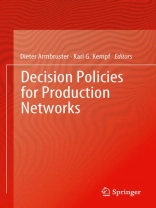The financial results of any manufacturing company can be dramatically impacted by the repetitive decisions required to control a complex production network be it a network of machines in a factory; a network of factories in a company; or a network of companies in a supply chain. Decision Policies for Production Networks presents recent convergent research on developing policies for operating production networks including details of practical control and decision techniques which can be applied to improve the effectiveness and economic efficiency of production networks worldwide. Researchers and practitioners come together to explore a wide variety of approaches to a range of topics including:
WIP and equipment management policies,
Material release policies,
Machine, factory, and supply chain network policies for delivery in the face of supply and demand variability, and
Conflicts between complex production network models and their controlling policies.
Case studies and relevant mathematical techniques are included to support and explain techniques such as heuristics, global and hierarchical optimization, control theory and filtering approaches related to complex systems or traffic flows. Decision Policies for Production Networks acts as handbook for researchers and practitioners alike, providing findings and information which can be applied to develop methods and advance further research across production networks.
Tabla de materias
1.An Overview of Decision Policies for Production Networks.- 2.Modeling and Control of Manufacturing Systems.- 3.The Ongoing Challenge for a Responsive Demand Supply Network: The Final Frontier—Controlling the Factory.- 4.WIP-Oriented Dispatching in Complex Manufacturing Facilities.- 5.Controlling a Re-entrant Manufacturing Line via the Push–Pull Point.- 6.JEDI: Just-in-Time Execution and Distribution Information Support System for Automotive Stamping Operations.-7. A Control Theoretic Evaluation of Schedule Nervousness Suppression Techniques for Master Production Scheduling.- 8.Chance-Constraint-Based Heuristics for Production Planning in the Face of Stochastic Demand and Workload-Dependent Lead Times.- 9.Traffic Flow Models and Service Rules for Complex Production System.- 10.Autonomous Decision Policies for Networks of Production Systems.- 11.Optimal Order and Distribution Strategies in Production Networks.- 12.The Production Planning Problem: Clearing Functions, Variable Lead Times, Delay Equations and Partial Differential Equations.
Sobre el autor
Dieter Armbruster is a professor in Arizona State University’s Department of Mathematics, where he has been Interim Chair since 2005. He has written scientific publications on dynamic systems, control, and nonlinear dynamics with applications in physics, chemistry, biology, and engineering. Over the last 10 years his interests have focused on applications of these mathematical techniques in modelling and decision-making in production systems.
Karl Kempf has been involved in the design and operation of successful commercial production systems in the automotive, aerospace, and semiconductor industries for over 30 years, including collaborations with university researchers. He has published scientific papers on various aspects of applying decision and control science to production systems and has presented at a number of national and international conference on these topics. Based on the scientific and business impact of his innovations, he has been elected to the US National Academy of Engineering.












